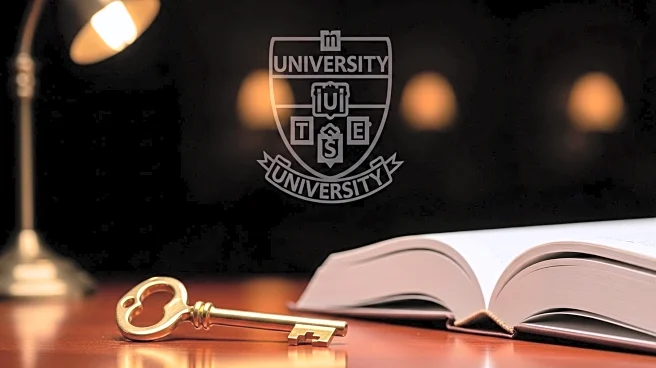What's Happening?
Widener University Commonwealth Law School, located in Harrisburg, Pennsylvania, has entered into a dual admissions agreement with Youngstown State University (YSU) in Ohio. This 3+3 program allows qualified YSU students to commence their law education at Widener Law Commonwealth during their senior undergraduate year. The initiative enables students to earn both a bachelor's degree and a juris doctor within six years. André Douglas Pond Cummings, dean of Widener Law Commonwealth, expressed pride in the partnership, highlighting the academic excellence and civic engagement tradition of YSU. The agreement facilitates an efficient and affordable pathway to legal practice for YSU students. Under the program, students will complete three years of undergraduate studies at YSU before transferring to Widener Law Commonwealth for the three-year juris doctor program. Credits from the first year of law school will be transferred back to YSU to fulfill remaining undergraduate requirements.
Why It's Important?
This agreement is significant as it provides YSU students with streamlined access to legal education, potentially reducing the time and financial burden associated with obtaining a law degree. The partnership offers students the opportunity to benefit from Widener Law Commonwealth's proximity to Pennsylvania's capital, enhancing their educational experience through externships, judicial clerkships, and legal clinics. The program also opens doors for financial aid, including need-based and merit-based assistance, making legal education more accessible. This collaboration reflects a growing trend in higher education to create pathways that integrate undergraduate and graduate studies, thereby fostering academic and professional development.
What's Next?
The implementation of this dual admissions agreement marks the beginning of a new educational pathway for YSU students interested in pursuing law. As the program unfolds, it is expected to attract students seeking efficient routes to legal careers. Widener Law Commonwealth may continue to expand its network of partnerships, potentially establishing similar agreements with other institutions. The success of this initiative could encourage other law schools to adopt similar models, promoting collaboration across educational institutions and enhancing access to legal education.
Beyond the Headlines
This agreement may influence the broader landscape of legal education by encouraging other universities to consider similar partnerships. It highlights the importance of inter-institutional collaboration in providing students with diverse educational opportunities. The program also underscores the role of law schools in adapting to the evolving needs of students and the legal profession, potentially setting a precedent for future educational models that prioritize efficiency and accessibility.










